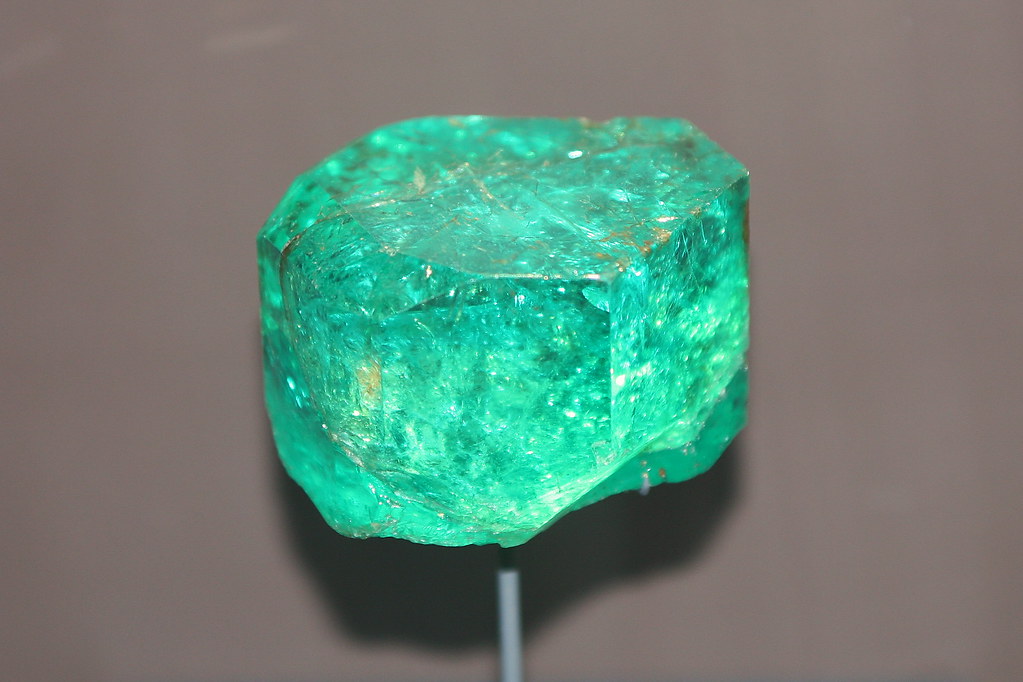Emerald, as we as a whole know, is a green shading gemstone shaped of the mineral family Beryl. In any case, a hefty portion of you would be astonished to realize that the green shading present in Emerald is additionally characterized advance in various types of green bringing about various valuing of emeralds.
The world popular 'Colombian Emeralds' have the most purest greens (likewise called the Sea Green) as a result of the follow measures of the mineral component Chromium. Because of the immaculate green shading, the cost of Colombian emeralds on the planet gemstones market is most elevated among all accessible emerald species. Notwithstanding the green shading, if a Colombian emerald has straightforwardness or clearness, then the sky is the point of confinement at its cost run. In some cases, they are as costly as $25,000 per carat.
The second costly types of emeralds are the Brazilian emeralds. Particularly, those mined from Sakota mines in Brazil. They are lesser green with tints of yellow to caramel yellow shading in them. Brazilian emeralds get their yellowish green tint due to the nearness of the component (VO2+) vanadium oxide alongside the beryl mineral. Brazilian emeralds regularly have a slight darker or dim cast.
The third most requested emeralds are separated from Zambian mines in Africa. These emeralds regularly show up excessively blue due, making it impossible to the nearness of iron substance in them. In all actuality, however, emeralds from each of the three sources might be shaded by more than one component.
Here, it merits seeing that on the off chance that you wish to wear the emerald in a ring or pendant for visionary utilize, then this distinction of shading is one of the four imperative parts of the nature of emeralds, other three being: Color, Clarity, Cut and Carat (weight).
Color
The most charming emerald tints are fairly blue green to unadulterated green, with the unmistakable shading inundation and a tone that is not exceptionally dull. The most-prized emeralds are significantly clear. Their shading is consistently appropriated, with no eye-perceptible shading zoning. In case the shade is exorbitantly yellowish or unreasonably light blue, the stone is not emerald, but instead a substitute collection of beryl, and its regard drops in like way.
Clearness
Emeralds normally contain considerations that are unmistakable to the unaided eye. Along these lines, exchange individuals and a few buyers comprehend and acknowledge the nearness of considerations in emeralds. Eye-clean emeralds are particularly profitable on the grounds that they're so uncommon.
In hued stones, straightforwardness and lucidity are firmly connected. This is particularly valid for emeralds. The exchange for the most part acknowledges eye-obvious considerations in higher-quality emeralds. Be that as it may, when the incorporations negatively affect straightforwardness and lucidity, they additionally drastically diminish esteem.
Cut
The cutter must consider the harsh's profundity of shading, sturdiness, and considerations when settling on cutting choices. Botches cause weight reduction, which incredibly diminishes the estimation of a conceivably significant diamond.
Four qualities of emerald gems make them hard to cut. In the first place, all emeralds have noteworthy breaks (once in a while called crevices in the exchange). A cutter must plan the slice to limit the impact of those breaks on the completed stone.
The second variable is expected somewhat to those inalienable breaks: Emeralds are more weak than a diamond like corundum. This makes them defenseless against harm amid cutting, cleaning, and setting, or notwithstanding amid imprudent day by day wear. The emerald cut can help secure against harm in light of the fact that the defenseless corners are faceted and give a similarly safe place to prongs.
Third, since shading is so imperative in setting up an emerald's esteem, the cut must boost the impact of tint, tone, and immersion. The cutter can influence shading by conforming an emerald's extents and number of features. The cutter can obscure a pale stone with a profound cut, a little table, and less aspects, or help a dim stone with a shallow cut, an extensive table, and extra features.
Fourth, the somewhat blue green to yellowish green dichroism of numerous emerald precious stones urges the cutter to situate the table so it's opposite to the gem's length. That way, the more evident shading in the cut diamond is the pale blue green that such a large number of emerald mates prize.
Colombian harsh is particularly testing because of the appropriation of shading specialists amid development. Its shading is more extraordinary nearer to the surface. Without cautious arranging and cutting, the completed stone may be significantly lighter in shading than the first material.
Carat
Outlined emeralds land in a broad assortment of sizes. There are emeralds in chronicled focuses and private collections that measure a few carats. At the other uncommon are minor emeralds that measure parts of a carat.
The Sandawana emerald mine in Zimbabwe is known for its unobtrusive, yet strikingly shaded stones. Its emeralds are as meager as 1 mm square, yet they're still firmly green. The mine's cut stones typical around 0.05 to 0.25 carat, and occasionally measure more than 1.50 carats. Renowned decorations sizes are by and large some place in the center.
The most diminutive sizes go from 1 mm to 5 mm, with weights from 0.02 to 0.50 carat, while 1 to 5 carat stones are predominant as center stones. Prestigious bits of diamonds can fuse emeralds that measure more than 20 carats.
BUY GEMSTONE ONLINE | FREE GEMSTONE RECOMMENDATION | CONTACT US | FOLLOW US ON FACEBOOK | TWITTER | GOOGLE+ | SUBSCRIBE OUR YOUTUBE CHANNEL FOR VIDEOS & INFO







No comments:
Post a Comment